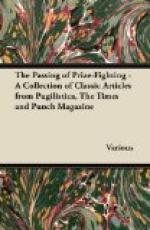* * * * *
Sir HARRY JOHNSTON has written a book which I find it difficult to define. His publishers and Mr. H.G. WELLS call it a novel, but bits of a biography and an autobiography and an African explorer’s account of his travels have all somehow squeezed themselves into it, and for readers whose birthdays began before the last quarter of the nineteenth century The Gay-Dombeys (CHATTO AND WINDUS) will best justify itself as a chronique scandaleuse. To penetrate the thin disguises in which the author has dressed his notabilities and to sort the composite or hybrid personalities into their component parts should provide the initiated with congenial if not very edifying occupation. The reader who is also a DICKENS enthusiast will be, according to temperament, delighted or outraged to find that Sir HARRY JOHNSTON has made his book as it were a continuation of Dombey and Son. Many of his characters are either the creations of Boz or their children and he contrives to carry on the interweaving of their lives to an unbelievable extent—even when the fullest allowance has been made for the smallness of the world. Florence Dombey and Walter Gay, as Mr. and Mrs. Gay-Dombey, actually survive well into the present book, while Sir HARRY JOHNSTON’S Eustace Morven, who tells us that he has reverted to the ancient spelling of his name, is the son of Harriet Carker and that hazel-eyed bachelor, Mr. Morfin, who lived and loved in Dombey and Son. But save in the chapter describing Eustace Morven’s appearance at the annual dinner-party given by Florence and Walter to celebrate the re-establishment of the firm, Sir HARRY JOHNSTON’S work has not a very pronounced flavour of DICKENS. It is to be hoped that this method of writing novels will not become popular. A series of sequels to everybody by somebody else opens up an intimidating prospect, at least for the reviewer.
* * * * *
Mr. PHILIP GIBBS has gathered together, under the title. Open Warfare, the Way to Victory (HEINEMANN), his despatches written from the Western front during the last year of the War. What strikes one most on seeing them again in book form is the obscurity in which they veil the events they record. They so shine, as it were, with a luminous mist that they seem to reveal everything, yet in sober truth very often it is only in the light of later knowledge that they reveal anything at all. Congratulations, therefore, to Mr. GIBBS, the perfect war correspondent! I defy anyone from these papers alone (apart from the plentiful and excellent maps) to form anything like an adequate conception of the disaster that swept down upon the British Armies in the Spring of 1918. And yet in a sense it is all there, gorgeously camouflaged under the control—I daresay the wise and necessary control—of the censorship.




